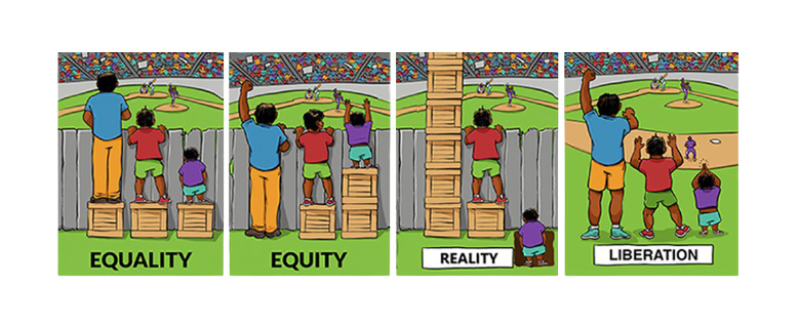 The popular saying: “If you build it, they will come” was first introduced in the 1989 baseball movie Field of Dreams. In searching the origin of this quote, all while thinking about equity work; it was a brilliant accident that I was also drawn to the baseball picture shown here (adapted from The Interaction Institute for Social Change by artist Angus Maguire). I have observed that many leaders and organizations mistakenly use an equality lens to create or “build” unique services and resources for their Black employees in an attempt to address anti-Black racism.
The popular saying: “If you build it, they will come” was first introduced in the 1989 baseball movie Field of Dreams. In searching the origin of this quote, all while thinking about equity work; it was a brilliant accident that I was also drawn to the baseball picture shown here (adapted from The Interaction Institute for Social Change by artist Angus Maguire). I have observed that many leaders and organizations mistakenly use an equality lens to create or “build” unique services and resources for their Black employees in an attempt to address anti-Black racism.
Have you ever wondered why Black employees don’t access the resources provided to address their experiences with anti-Black racism? As illustrated in the picture, it is not enough to invite someone to a baseball game where there may be barriers to fully access the game. Similarly, if we are attempting to meet the needs of our Black employees, it’s not enough to create services without considering the barriers that may grant full access or access at all. Leaders have to consider the distinct needs and therefore unique processes and interventions required to ensure services will in fact be accessible and meet their employees’ needs. If leaders fail to do so, then they risk wasting time, money, and creating more distrust. Inevitably, organizations will only be “building” missed opportunities for racialized employees to access the resources needed to support their overall wellness.
Equality = Same Treatment
Equality is about people being treated exactly the same, without any focus on possible past and/or present challenges and barriers. Unfortunately, equality ignores the harsh reality of systemic racism in the daily lives of Black employees. In turn, this approach not only ignores and invalidates the experiences of Black employees, but it also creates barriers by perpetuating racism through silencing these experiences. Our history has left a legacy that ensures systemically, we all are not treated equally in the present, and so our approach to addressing racial oppression won’t work through an equality lens either.
Equity = Fair Treatment
Equity, on the other hand, seeks to eliminate barriers to historically underserved and marginalized groups, to ensure they and all groups can gain fair treatment, access, opportunity, and advancement. In approaching the creation of services and resources in the workplace through an equity lens, it sends a clear message to Black employees that they are seen, heard, and valued in the workplace. Black employees will be more inclined to engage in services that they can trust will meet their needs. If leaders and organizations are truly committed to their Black employee’s well-being, then they must commit to going above and beyond to reduce barriers, while truly understanding the needs of these employees.
I applaud the leaders and organizations who have understood the importance of creating spaces and services for Black employees to navigate anti-Black racism. Now, when you notice your employees are not showing up or showing up in small numbers, and you have decided to move with an equity lens in this work. As you do that, I want you to consider the 3 barriers of Racial Trauma (the daily experience of race-based traumatic stress that systemically occurs in blatant and subtle ways), Psychological Safety (when one believes they are working in an environment where they can take interpersonal risks), and Systemic Workplace Barriers. I hope you’ll join me in future posts when I dive deeper into these 3 key barriers and what to consider when dismantling them. In the meantime, I ask:
What are some other barriers you believe may be preventing Black employees from accessing programs or services created to help address the toll of anti-Black racism in their lives?
I’d love to hear your thoughts.
Print this entry

Felecia Phillips Ollie DD (h.c.) is the inspiring leader and founder of The Equality Network LLC (TEN). With a background in coaching, travel, and a career in news, Felecia brings a unique perspective to promoting diversity and inclusion. Holding a Bachelor’s Degree in English/Communications, she is passionate about creating a more inclusive future. From graduating from Mississippi Valley State University to leading initiatives like the Washington State Department of Ecology’s Equal Employment Opportunity Program, Felecia is dedicated to making a positive impact. Join her journey on our blog as she shares insights and leads the charge for equity through The Equality Network.




